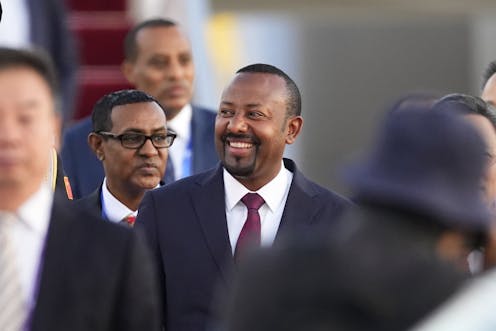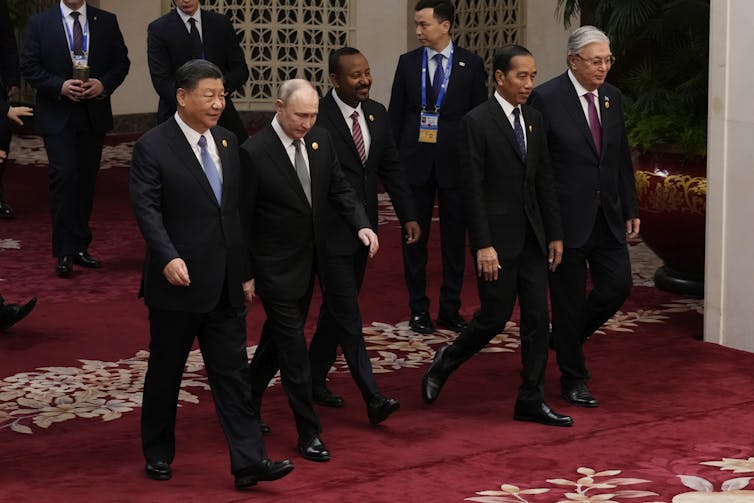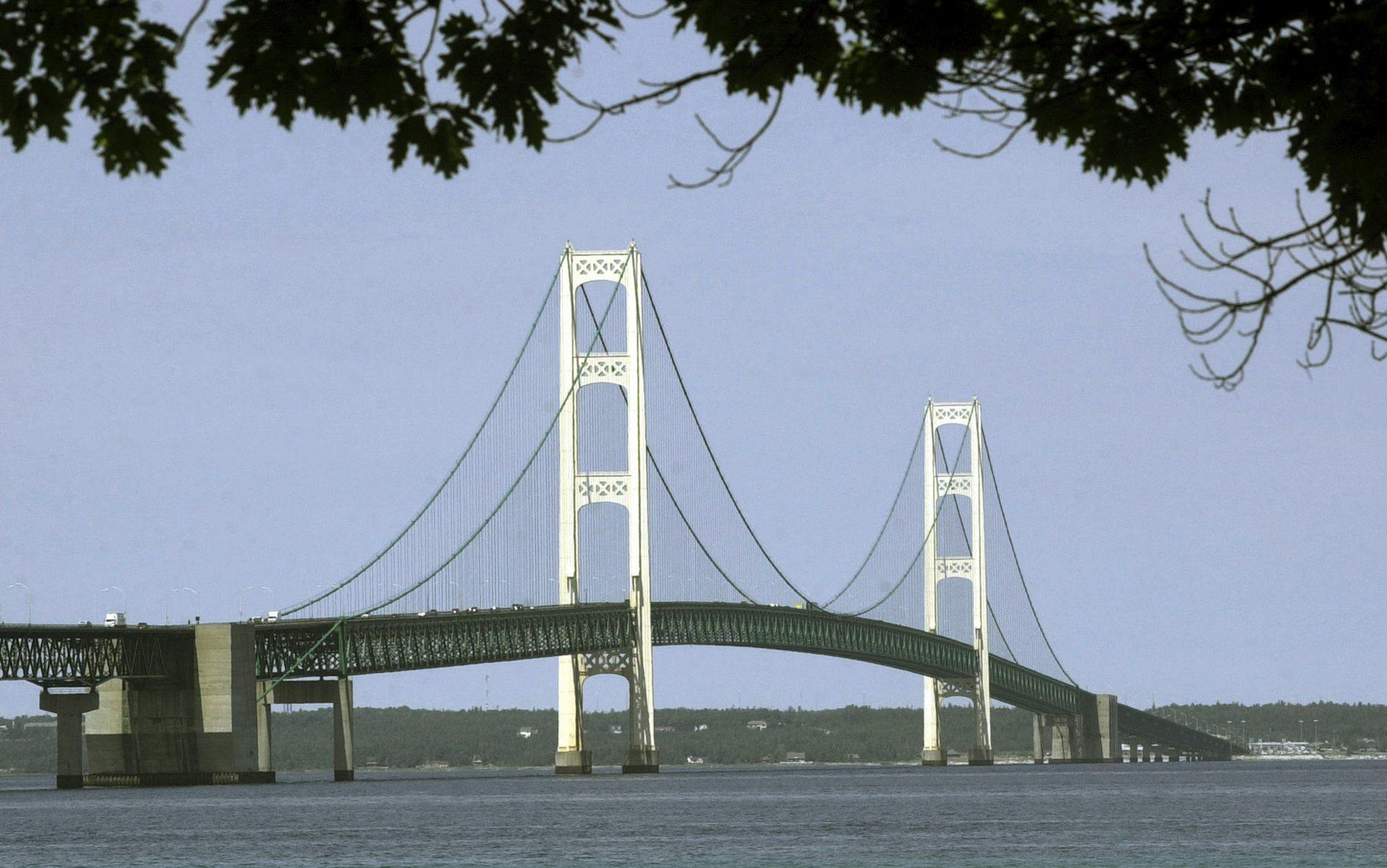Ethiopia's Abiy takes a page from Russia, China in asserting the right to restore historical claim t
Ethiopian Prime Minister Abiy Ahmed claims his landlocked country has a right to demand maritime access to a Red Sea port from its neighbors in the Horn of Africa − Somalia, Eritrea and Djibouti.

Ethiopian Prime Minister Abiy Ahmed claimed on Oct. 13, 2023, that his landlocked country has a right to demand maritime access to a Red Sea port from its neighbors in the Horn of Africa – first through diplomatic means, he said, or by force if necessary.
In confrontational language, Abiy all but threatened conflict should Ethiopia be denied what he called the country’s intrinsic right to waterway expansion. He has since sought to soften his comments, but the remarks have nonetheless rattled the region.
Such a move would help Ethiopia to reassert itself as the dominant player in the Horn of Africa, located in East Africa along a strategic maritime trade route. Ethiopia has been landlocked since coastal Eritrea broke away and became independent in 1993 after a decadeslong war.
Abiy, a Nobel Peace Prize winner once acclaimed for promoting peace and international cooperation but later accused of being a belligerent warmaker, has alarmed countries in the region with his recent remarks. Abiy invoked a 19th-century Abyssinian warrior, Ras Alula Aba Nega, who had proclaimed the Red Sea as Ethiopia’s “natural boundary.” The concern is in attempting to assert itself, Ethiopia might risk reigniting a conflict.
Abiy’s comments come at a time when Ethiopia is in a period of soul-searching, caught between the paths of democracy and authoritarianism. They also signal a potential willingness by Abiy to break with international norms amid a growing shift away from once welcoming powers in the West.
His rhetoric echoes ambitious geopolitical powers like China and Russia, both of which have shown a willingness to use military force to dominate strategic waters – as evidenced by Russia’s invasion of Crimea in 2014 and China’s military posturing in the South China Sea.
They also come at a time when Abiy struggles to unite Ethiopia behind a single ideological nationalism and is unable to contain insurgencies by two ethnic groups – the Amhara paramilitary organization Fano and the Oromo Liberation Army – both of whom hold historical grievances against the Ethiopian government and strive for greater political self-determination.
Africa’s ties with the major powers

As a researcher in international relations and conflict resolution, I have watched as African countries have been courted by international powers, partly because of sea trade routes. Africa’s sea trade routes are of strategic and economic importance for major powers like China and the U.S. They provide international shipping and trade, and access to critical resources. They also are key for maintaining geopolitical influence, as evidenced by military outposts such as the U.S. base in Djibouti and Russian attempts to establish a naval presence in the Red Sea.
Abiy’s new diplomatic alliances were on display on Oct. 18, 2023, during his visit to China for a forum on the Belt and Road Initiative – an infrastructure project that has seen China grow its influence across the Global South. During the meeting, Abiy was seen walking in step with Presidents Xi Jinping and Vladimir Putin. Photos from the conference seemingly conveyed Abiy’s alignment with those leaders and renewed Washington’s long-standing concerns over its weakening ties to Ethiopia.
Such concerns have been in the air since the outbreak of Ethiopia’s Tigray war in late 2020. The conflict led to President Joe Biden’s Executive Order 14046, imposing sanctions on certain persons in the Ethiopian government over documented human-rights abuses, and subsequent economic and arms embargoes, effectively isolating Ethiopia from its traditional Western allies.
In response, Ethiopia turned toward China and Iran, procuring drones that eventually tipped the balance in the Tigray conflict. The Ethiopian government’s rhetoric has since become increasingly Eastern-focused, distancing itself from the West.
This shift culminated in Ethiopia’s accession alongside five other states, including Iran, to the BRICS group, composed of Brazil, Russia, India, China and South Africa – a move that offers Ethiopia additional avenues to circumvent future U.S. sanctions.
Domestic turmoil
In addition to emulating Russia and China, the timing and riskiness of Abiy’s maritime motivations warrant scrutiny, especially given Ethiopia’s ongoing internal strife.
I believe that a motivating factor for the maritime claim is Abiy seeking to galvanize the people of Africa’s second most populous country through the creation of a potent nationalist narrative. This comes in the wake of his unsuccessful “Medemer” campaign, which tried but failed to create a single unifying ideology for Ethiopians to rally behind. Medemer, which means “togetherness,” was coined by Abiy when he took power in 2018 in hopes to unite and galvanize an Ethiopia divided along ethnic lines for the past 30 years.
In addition to the insurrection threat, Ethiopia is beset by political violence, hunger and poverty, and worsening religious tensions, problems that Abiy may want to divert attention from.
What Abiy risks
Abiy’s bold rhetoric may backfire in several ways, both domestically and internationally.
Given the heightened state of regional alert following Abiy’s comments, his approach could easily lead to escalated tensions or even armed conflict with neighboring countries. There are already reports of Eritrea being on high alert amid Ethiopia’s amassing troops between its border and Eritrea.
Abiy’s attempt to distract from internal discord may inadvertently generate new crises for Ethiopia’s already stretched military and recovering economy, and thereby jeopardize Ethiopia’s already strained economic and security capabilities.
In addition, Abiy’s attempts to emulate global powers like China and Russia and impose its will through force carries its own risks. China and Russia have the military might to enforce their geopolitical ambitions, a luxury that Ethiopia does not have.
And it is unlikely that China will extend the same level of support to Ethiopia as it did to Russia during its invasion of Ukraine. Unlike with Russia, Beijing doesn’t rely on Ethiopia for access to raw materials it needs. Similarly, Russia is not expected to supply arms to Ethiopia while it is seeking to replenish its own arsenal from North Korea to continue its fight in Ukraine.
As such, trying to adopt a similar assertive maritime stance in a region already fraught with tensions could prove disastrous for Ethiopia – plunging the country and its neighbors into extended turmoil.
Mahad Darar does not work for, consult, own shares in or receive funding from any company or organization that would benefit from this article, and has disclosed no relevant affiliations beyond their academic appointment.
Read These Next
Why does pain last longer for women? Immune cells may be the culprit
Your immune systems kicks into gear when you’re injured, both worsening and relieving pain.
‘Probably’ doesn’t mean the same thing to your AI as it does to you
Humans and AIs have different methods of calculating words about probability like ‘maybe’ and ‘likely’…
Supreme Court’s Michigan pipeline case is about Native rights and fossil fuels, not just technical l
The issue in front of the US Supreme Court is seemingly mundane, about federal or state jurisdiction.…





